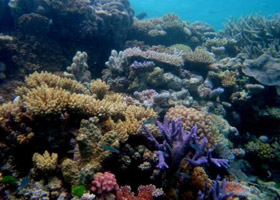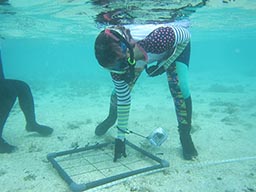- ABOUT US
- PROGRAM AREAS
- CONSERVATION APPROACH
- EDUCATION
- MULTIMEDIA
- Work with regional initiatives to build marine protected area networks and enhance local management capacity to support coral reef conservation and the people that depend on them;
- Develop tools and practices to more effectively observe, predict, communicate, and manage the impacts from a changing climate; and
- Strengthen local and national capacity to reduce the impacts of fishing and pollution on coral reef ecosystems and respond to emerging issues, such as coral disease outbreaks.
International Engagement

Conserving the nation's coral reefs cannot be accomplished by domestic efforts alone. Our coral reefs are ecologically connected to those abroad. Additionally, the most significant threats they face—climate change and ocean acidification—are global in nature.
Effectively conserving coral reefs and the services they provide depends upon sound ecosystem-based management practices and good governance—from local communities to multinational regions. Together with our partners, we work in more than 40 countries and multilateral regions globally, with particular focus in the Coral Triangle, Micronesia, the South Pacific, and the wider Caribbean
What We Are Doing
The Coral Reef Conservation Program International serves as the U.S. government's scientific and technical body to strengthen governance and management capacity. Our international strategy is designed to bring more focus to topics and regions where we can have the greatest impact by building on NOAA's strengths, enhancing partnerships, and leveraging resources, and expertise. Our major focus is on marine protected areas where we:
About Us

The NOAA Coral Reef Conservation Program was established in 2000 by the Coral Reef Conservation Act. Headquartered in Silver Spring, Maryland, the program is part of NOAA's Office for Coastal Management.

The Coral Reef Information System (CoRIS) is the program's information portal that provides access to NOAA coral reef data and products.
Work With US
U.S. Coral Reef Task Force
Funding Opportunities
Employment
Fellowship Program
Contracting Assistance
Graphic Identifier
Featured Stories Archive

Access the archive of featured stories here...
Feedback
Thank you for visiting NOAA’s Coral Reef Conservation Program online. Please take our website satisfaction survey. We welcome your ideas, comments, and feedback. Questions? Email coralreef@noaa.gov.
Stay Connected
Contact Us
NOAA’s Coral Reef Conservation Program
SSMC4, 10th Floor
1305 East West Highway
Silver Spring, MD 20910
coralreef@noaa.gov
